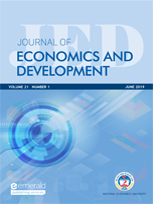Does regional trade promote economic growth? Evidence from Economic Community of West African States (ECOWAS)
Keywords:
Regional and non-regional trade, Economic growth, ECOWAS, Dynamic panel GMM
Abstract
PurposeThis paper examines the impact of regional and non-regional trade on economic growth using annual data from Economic Community of West African States (ECOWAS) member countries for the period 2007 to 2017.
Design/methodology/approach
Trade data were decomposed into regional (trade among ECOWAS Member States) and non-regional (trade between ECOWAS Member States and the rest of the world). We used the dynamic system GMM to estimate the models and introduced exchange rate, unemployment rate, population growth and gross capital formation as controlled variables.
Findings
The results revealed that the estimated coefficient of ECOWAS regional trade is statistically significant and positive in predicting growth, while the non-regional trade coefficient is negative and not statistically significant in predicting growth. Other predictors of growth introduced into the model as controlled variables, such as exchange rate, unemployment rate, population growth and gross capital formation, displayed mixed results. More importantly, population growth, unemployment and exchange rate depreciation hurt economic growth, while gross capital formation promotes economic growth.
Practical implications
The findings provide strong support in favour of the Krugman (1991) hypothesis that regional trade agreements (RTAs) are a better alternative to global trade.
Originality/value
Our decision to disaggregate ECOWAS trade is unique and influenced largely by the objective of the study, which is to establish the type of ECOWAS trade that is a good predictor of growth. The evidence from our findings support the theory that RTAs are a better catalyst to economic growth.

